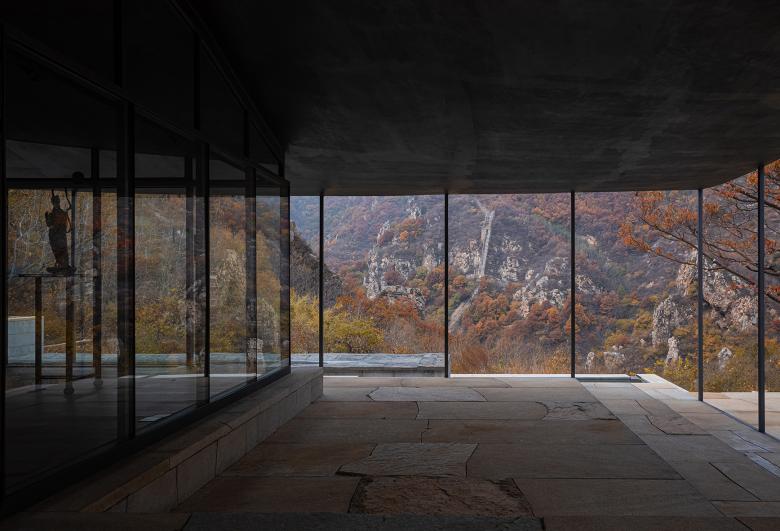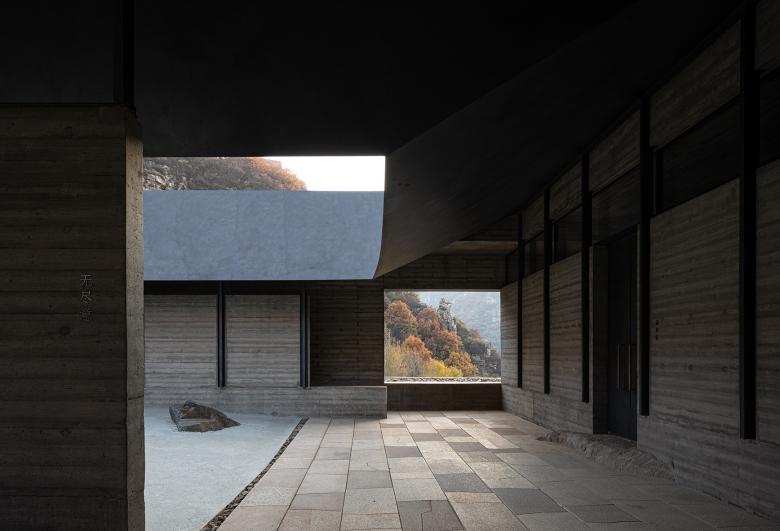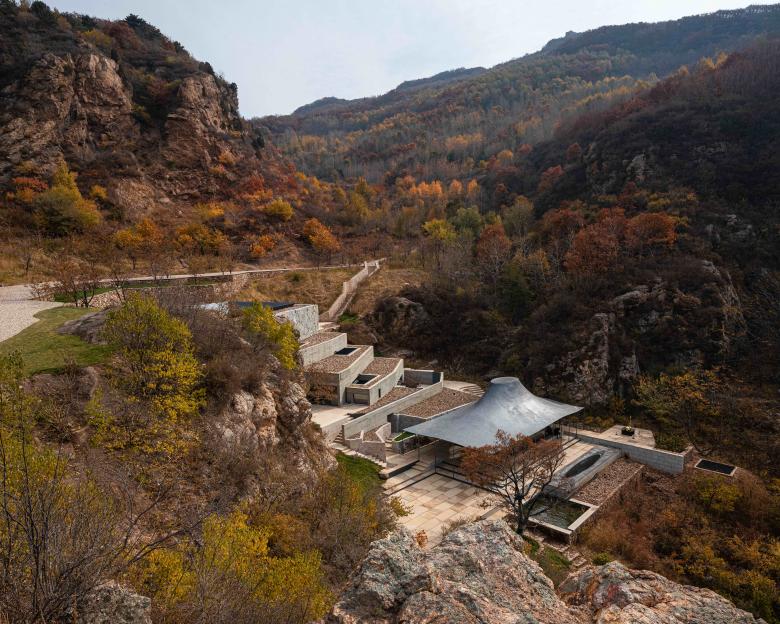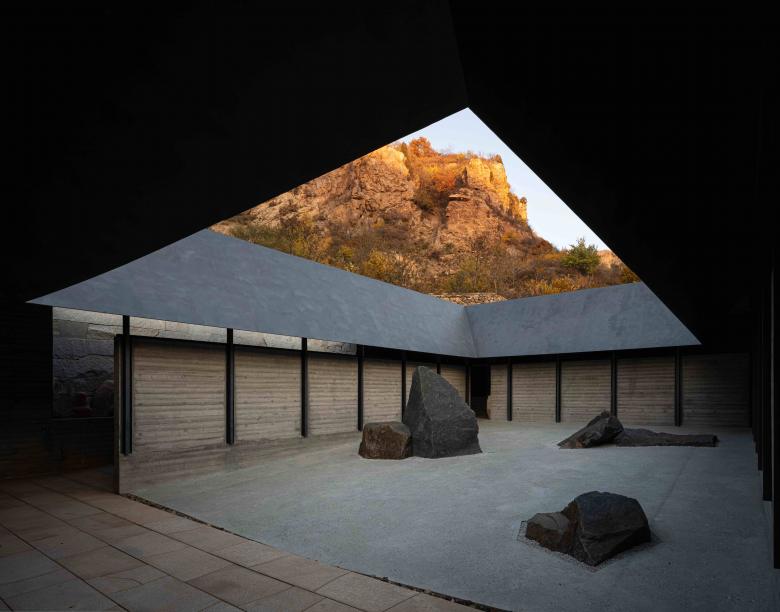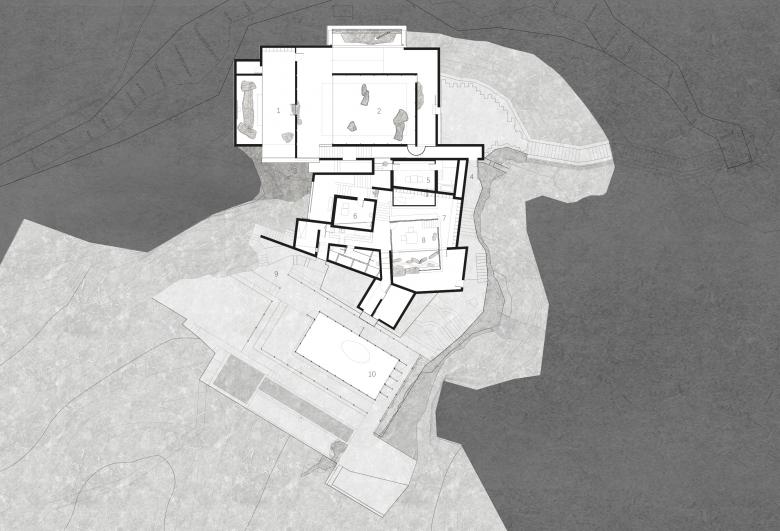Upper-Cloister in Jinshan Mountain
Chengde, China
- Architects
- Atelier Deshaus
- Localització
- Chengde, China
- Any
- 2022
The Upper-Cloister in Jinshan Mountain is not an ancient temple, but the ancient Great Wall at far is an unprecedented miracle. The establishment of the upper-cloister has set a new point-in-time for the valley.
The valley of the site had been developed for coal mining and terrace farming. Except the open meditation hall on the lower platform, the new upper cloister is built against the mountain slope, translating the 1.6-meter stepped landscape terrain into the spatial form and scale of the building. It is both terrain and architecture.
The entrance is arranged around an open stone courtyard, with a Buddhist hall for statues on one side. The courtyard conveys the spatial atmosphere of the traditional corridor courtyard with the thin steel plates hanging inward and the thin steel columns attached to the concrete enclosure wall. The upward opening of the open courtyard frames a view towards the sky. On the other hand, the horizontal opening facing the valley on the west side precisely frames the Great Wall and a natural stone statue. The Buddhist hall is named "Omniscience Hall", meaning to free oneself from troubles with the wisdom of universal knowledge.
The inner gardens of various scales were created by Shunmyō Masuno, who is both a landscape architect and a monk. The stone courtyard at the entrance named "Immersed in" is composed of five different rocks, implying the five aggregates of clinging in Buddhist culture, "form, sensation, perception, activity, and consciousness". It is paved with light-colored chiseled concrete. At dusk, the yard is still bright, like the sea under moonlight.
The meditation hall with steel structure and carbon fiber roof at the mountain foot is a pictographic reconstruction of the Chinese character "舍". It is composed of three parts: "亼+屮+口" (roof, beam and column, and the base). Two rings of slender steel columns support the curved roof. When one is in the hall, the cliffs get really enclosing, and only opens up to the valley. The meditation hall and its surrounding space named "Aranya" is exactly the spatial portrayal of the term’s original intention of "a quiet place in the world, a place to find the self".
Therefore, a series of spaces form a sequence from top to bottom. All are attached to the terrain, forming an orderly rhythm. The valley below is full of fruit trees and herbs, with winding stone paths leading to the ancient Great Wall.
Atelier Deshaus
Founded in 2001, Atelier Deshaus is one of the first independent architectural firms in China. Its co-founders and principal architects are Liu Yichun and Chen Yifeng. Their Shanghai-based studio began by working mainly on public buildings such as schools and museums, attracting international recognition and winning numerous awards. The studio was listed in the ‘2011 Design Vanguard’ by Architectural Record, and its most representative project, Long Museum West Bund, won the AR Award 2014 for Emerging Architecture, the Honor Award for Architecture 2019 from AIA’s China Chapter, ARCASIA Awards for Architecture 2020, Gold Winner (Public Amenity: Social and Cultural Buildings), etc.
The office has been invited to participate in many international exhibitions, including ‘Alors, La Chine?’ at Centre Pompidou in 2003, ‘Eastern Promises’ at the MAK Austrian Museum of Applied Arts in 2013, ‘ZAI XING TU-MU: Sixteen Chinese Galleries and Fifteen Chinese Architects’ at the Aedes Architecture Forum in Berlin in 2016, and “Reuse, Renew, Recycle: Recent Architecture from China” at MoMA in 2022. It has held solo exhibitions including “Sensitive Urbanity: Atelier Deshaus in Shanghai” at the RIBA London Headquarters in 2022, and “Common Landscape: Re-cultivating Industrial Sites” at the Aedes Architecture Forum in 2023.
Client
Aranya Real Estate Development Co., Ltd
Building and Construction
Structure Consultant: AND Office
Structure and M&E: Beijing Yanhuang International Architecture&Engineering Co., Ltd
Landscape consultant: Shunmyo Masuno + Japan Landscape Consultants (courtyards and gardens), Turenscape (environment)
Statue of Buddha : The Jiangs
Lighting consultant: Zhongchenyuanzhan Lighting Design Co., Ltd, DLX Lighting Design
Construction: Chengde County Hongsheng Construction & Installation Engineering Co., Ltd, Jimusi Sanjiang Architectural Engineering Co., Ltd
Interior Construction: Beijing Wandan Construction & Installation Engineering Co., Ltd.
Garden Construction: Changzhou Innovation Garden Engineering Co., Ltd.
Intelligent construction and technical development (for the Zen Hall): RoboticPlus.AI
Steel Structure Consultant: Shanghai Dexu Construction Development Co., Ltd
Faux finish: Shanghai Yujia Construction Technology Co., Ltd.
Carbon Fiber Consultant: Shandong Huaye Wind Power Equipment Co., Ltd
Glass Consultant: Shanghai Rilang Doors and Windows Co., Ltd / Shanghai Lanshi Glass Co., Ltd
Stone Consultant: Yiboyuan Sculpture Co. Ltd
Area
Floor area, 615 sqm
Projectes relacionats
Revista
-
Winners of the 5th Simon Architecture Prize
hace 4 dies
-
2024, The Year in …
hace 6 dies
-
Raising the (White) Bar
hace 6 dies
-
Architects Building Laws
hace 1 setmana
